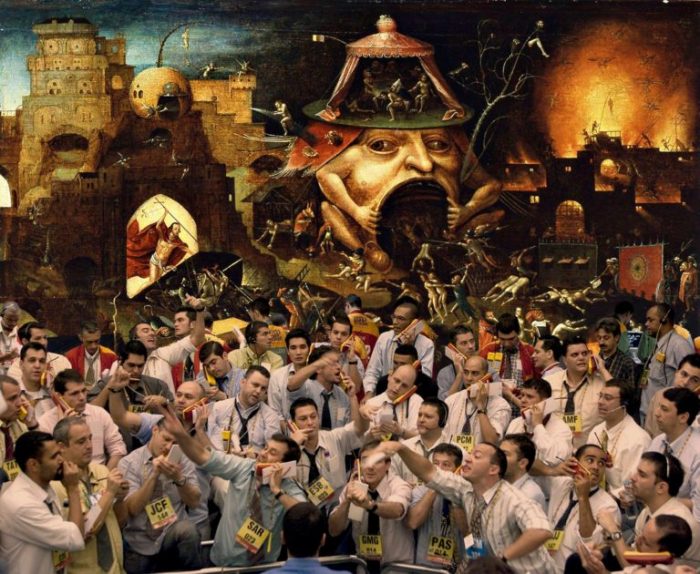Check
Chronicles of the psycho-deflation #6
“When the Lamb opened the seventh seal, there was silence in heaven for about half an hour. And I saw the seven angels who stand before God, and they were given seven trumpets.”—Revelation 8:1
April 29th
There is a guy whose name I don’t say (let’s call him F.Z.) who’s my friend on Facebook, but you know a so-to-speak kind of friend. He never misses an opportunity to call me an idiot, and sometimes I am friendly, sometimes I am not.
But I was always somehow fond of his scornful comments as a very radical anarcho-Marxist who hates intellectuals like me. How to blame him?
Today, for the first time ever, he deigned to send me a rather long articulated and non-polemical message. Maybe he forgave me, who knows. So I’ve read it.
Below I report an excerpt, not the whole thing but almost, I took the liberty of making some edits and clarifications, as far as I understand F.Z. wrote it in one go, since he doesn’t have time to waste with me.
“If from the point of view of the organization of power, the history of the last 14,000 years has apparently been fragmented and non-linear, there is instead an absolutely coherent trend. That is, the elimination of physical spaces. [My note: I would rather say that the privatization of physical spaces which leads to their elimination for the majority.] As archaeologists tell us, one of the very first things that happened in city states like Uruk was to name the land. The land was owned by a king, or by a city, and belonged to a “legal” entity. In the years of the wars between the Hittites and the Sumerians, extradition agreements were made. That is to say, you no longer had free access to the land. You were tied to a ground, a place. This process has always continued until English enclosures in the 1600s transformed common lands, no man’s lands, into state lands. To date there is not a single square centimeter on earth that does not belong to someone, or don’t have an owner. And anything that has an owner, can be sold. A frightening example of this process were the Zionists’ purchases of land in Palestine. Or the British who enforced on the indigenous peoples of Africa land register control, aware there laid colonial control and victory. Today we are at a historic breakthrough. Science fiction books have long told us about machines taking over. We recognize our property as the only possible living space. So everything must be owned—every street, every garden. You will have concessions to travel through that territory, but by making use of rentable private space. In such a world, it seems logical that the state should end, inasmuch as the state property should no longer exists, as the monopoly of force no longer belongs to the nation states, since the Glovo/Google/Amazon taxes do not end up in the national coffers, the jurisdiction no longer appeals to the constitution, the state no longer bills money since the national currency no longer exists, while the public disappears. At this point, for total control, the consumer should be connected 24 hours a day while being terrified by any physicality. In this we are at a good point, most people already prefer to be home. 5G, in this sense, is indispensable. A technology that allows you to manage 2 billion subcutaneous devices, beside home automation. So what we are experiencing with 5G is actually that large private companies are buying our places for living—land grabbing.
PS: Obviously the virus itself has no role in this story. Virus as a problem in itself does not exist. There is fear, which does indeed attack our weakness, and the terror of dying, having ourselves and our body as the only horizon.”
Then F.Z. concludes with a wish: “They told us from an early age that the people cannot win, and clearly they say it to convince us to inaction. If you have children, or a shred of dignity, this is the time to return to being nomadic. It’s time to throw your computer out of the window. All at once, in an epic act of rebellion.”
April 30th
The Trump administration cuts funding to states just as they are under the virus’ attack. You have to do it alone, he says to the New York and California governors. It is a way of pushing governors to give up the lockdown, to resume economic activity at all costs, while groups of armed Trumpists enter the Michigan government building. One of the anti-lockdown protesters carries a sign claiming that work gives freedom. The sign is written in German, and says exactly “Arbeit macht frei.”
May 1st
The Economist is concerned with the brutal realism that has always characterized this ancient newspaper: the free market is in danger.
The Fed’s purchases of treasury bills look a lot like printing money to finance the deficit. The central bank has announced plans to support the flow of credit to businesses and consumers. The FED acts as a last resort lender to the real economy, not only to the financial system…
Larry Kudlow, director of America’s National Economic Council, calls the fiscal stimulus decided by the Trump administration “the largest assistance program for Main Street in the history of the United States” comparing it to the Wall Street bailouts of just a decade ago. In America, citizens will receive checks for $1,200—with Trump’s signature on it. Supreme arrogance.
Still the Economist writes that the state model that emerged in Europe between the 1950s and the 1970s, in which bureaucrats controlled services from electricity to transportation would have been unimaginable without the experience of war, in which the state controlled practically everything, and ordinary people made tremendous sacrifices both on the battlefield and at home.
Catastrophes such as wars and pandemics favor the strengthening of the state apparatus, continues the economist, who fears above all that the state will impose taxes on its wealthy readers. The new idea that the government must at all costs save businesses, jobs and the workers income, could be consolidated. An increasing number of countries will try to be self-sufficient in the production of strategic goods such as medicines, sanitary material and even toilet paper, causing a further retreat from globalization. The role of the state could change definitively. The rules of the game have changed in one direction for centuries, but now a radical turn is on the horizon.
The state socialism that the Economist thinks is emerging from the demand of support measures and the strengthening of public intervention in sectors such as health care scares the newspaper, faithful to global neoliberalism. Understandable. But can state interventionism in itself save the situation, can it give back some energy to an exhausted social body? I don’t think so.
The power of money seems to have weakened.
For too long the techno-financial acceleration and precariousness have led to the exhaustion of the mental energies of mankind: now the world seems to have entered a state of permanent debilitation.
In 1976 Baudrillard had sensed that only death escapes the capital code. Long removed from the scene of unlimited expansion, death now reappears on the horizon. In the neoliberal digital era, financial abstraction has put society in check. Then the bio-info-psycho-virus came, as a proliferating material concretion that put the abstraction of capital into checkmate.
Now, a new game begins.
As in Bergman’s film where the noble knight Antonius Block, returning from the crusade, meets Death waiting for him on the beach of a stormy sea. Around, in the northern lands, plague and desperation rage, and Antonius challenges Death to a game of chess, and Death agrees to postpone. So now the colors of extinction are drawn on the horizon of our century, and the chess game can begin. We will give her the name of a play by Samuel Beckett in which Nagg and Neil are in the garbage can, while Hamm is blind and cannot walk.
It seems to me that to win this new game it would be necessary to make two simple moves, or perhaps three: redistribute the wealth produced by the community, guarantee a sufficient income to lead a very frugal existence to everyone, abolish private property, invest everything in research, education, health and public transportation. Quite simple, isn’t it? Unfortunately I don’t think we are up to it—by we I mean “us” the human race. Simply mankind doesn’t live up to the situation, there is not much to do. And as Pris, the Blade Runner replicant says—we are stupid, we will die. There is no need to make a drama out of it.
The bio-virus is the irruption of sub-visible matter into the techno-capital abstract cycle.
The protest cries, the Molotov cocktails thrown against the banks windows, the vote of the majority of Greek citizens could not stop the financial aggression against social life, nor could the reasonable considerations of economists and journalists who had noticed the extreme danger in the crazy concentration of wealth in the hands of a tiny minority.
Now the bio-virus takes its revenge, but there is no way to govern it, to bend it to the common good. Thus it becomes an info-virus, moves to the infosphere and saturates the collective mind with fear, suspicion, distance. The risk is that it would stabilize itself as a psycho-virus, as a potential phobia of epidermis, as a paralysis of erotic desire, and therefore as a generalized depression, and finally as a latent aggressive psychosis, ready to manifest itself in daily life or in the disrupted geopolitical dynamics.
The bio-info-psychotic circuit of contagion has rendered the traditional instruments of financial intervention useless, and has paralyzed the political will, reducing it to a military execution of a health program.
May 3rd
I received a message from Angelo that ends like this: “We believed that the earth, now totally anthropized, would no longer hide surprises from us and instead we are entering a ‘terra incognita’ where viruses are like the ‘leones’ of the past. Well, I follow your diary with some anguish, having almost exhausted the hopes that the prophecies you distill, scrutinizing the horizon day by day, can become less hazy and desperate than they appear.”
Nathalie Kitroeff reports in the New York Times that the American ambassador to Mexico is pressing for the factories in the North of Mexico, which supply the Yankees’ cars cycle, to start working again, despite the contagion, despite the confinement measures decided by the country’s authorities, under Trump wall’s constant threat.
Christopher Landau—that’s the ambassador’s name—said that if Mexico doesn’t meet North American needs, it will lose the orders that keep those factories going. He is the ambassador of the country we consider the leader of the West, of the country which, in the past forty years, inspired the reforms imposed by armed forces and finance. But it is legitimate to nourish the hope that this country won’t survive the catastrophe that is currently overwhelming it. Misery, unemployment, depression, psychotic violence, civil war will soon shatter it, they are already shattering it. Unfortunately, before disappearing, the American psychotic empire will use, or attempt to use, the devastating force its army is still the depository of.
It is for this reason, rather than for the effects of the coronavirus, that the extinction of human civilization on earth is currently the most probable prospect. After five centuries, it is quite difficult not to see it: as America has been the future of the world, now America is the abyss in which the world seems destined to disappear.
From his Parisian confinement Alex wrote me this message on Facebook:
“The coronavirus is a form of material imagination the earth is questioning us with, about the possible becoming of our species and of the entire planet. Those who thought that the imagination belonged only to man in the abstract forms of symbolic recombination were greatly mistaken. A small material mutation (organic? Inorganic? irrelevant) destroys the great symbolic constructions that were destroying every form of life on the planet. It destroys and re-imagines, since every recombination of the virtual cannot help but demolish and create new spaces of possibilities. Chaosmosis… “
On Psychiatry Online, Luigi D’Elia supports the thesis that the principle of reciprocity is destined to take the place of the debt principle, provided that—he doesn’t say this but it seems implicit—society won’t end up disintegrating: now is the time to accept that all debts are unsolvable, so to cancel the concept of debt from the economy, and to replace it with that of reciprocity.
The prime minister of Ethiopia explains this with absolute clarity in an article published in the New York Times, Why the global debt of poor nations must be canceled. Reciprocity stands for interdependence and interconnection. Only such a thing as a pandemic makes the thread that binds everyone visible. The evolutionary plan of the new (anti-market) rationality is that it now becomes “convenient” (in a classic utilitarian sense) to collaborate and review the rules of the game. Among them, debt tyranny is the first to fall.
When I can’t pay my debt to you anymore, my downfall is your downfall. The infection has made this clear. The Germans have some difficulty accepting this concept, but soon they will have to make up for it.
If we are not able to radically change the general form in which human activity takes place, if we are not able to get out of the model of debt, wages and consumption, I would say that extinction is guaranteed over two generations. Do you think this is a somewhat bold statement? Me too, however, I begin not to see a third way between communism and extinction.
It must also be said that extinction per se is not that bad to imagine. The earth gets rid of its arrogant and greedy host, and goodbye.
But unfortunately it will not happen that fast, it’s not like we’ll fall asleep at midnight and we’ll be gone in the morning. Extinction is a process that has started a few years ago and will take place over the course of a century. Masses of starving populations moving desperately in ever-expanding deserts, wars of extermination for the control of water resources, wildfires that devastate entire territories, and of course increasingly frequent viral epidemics. We should have understood that from now on capitalism will only be an ocean of horror.
May 4th
In the middle of the afternoon we inflated our bicycle wheels and went for a round in the city center. Cars have started to circulate again, but only few. Girls in shorts and young men on their electric scooters. Almost everyone has a mask.
It is the day of the restart—wow. But to go where? Confindustria paws, for a boss it’s normal that millions of people sink into disease and death, as long as competitiveness does not decrease.
“I fear the idea of normalizing social distance, not being able to hug, touch: this prophylactic perspective gives me panic”—Alejandra writes to me. She wrote her doctoral thesis on digital identity issues and should defend it, but when and how? Probably in September, remotely.

May 5th
Trump was convinced that his name, that ridiculous, vulgar-sounding monosyllable had gained absolute primacy in the media-scape of all time. He even said it somewhere, if I remember correctly, that his name was the most mentioned one since there was a global public sphere. I believe he is now enraged by the fact that the word “coronavirus” has blown that record.
In its usual fifty-years-late provincialism, Il Corriere della Sera interviews French intellectuals as if they were still alive. Today, they propose a short text by Houellebecq, who says: “statements such as ‘nothing will be the same as before’ don’t even cross my mind. On the contrary, everything will remain exactly as it is. The development of this epidemic is indeed remarkably normal.”
Everything will remain exactly the same, says Houellebecq, lucky him.
I see some sort of unhinging. Social life has derailed out of its formal hinges, and out of psychic hinges. The pivot of work, the pivot of debt, the pivot of wages, they no longer hold. The pivot of supply and demand no longer holds together flows of goods, such as oil that keeps on sailing the oceans because all deposits are full.
Money, the hinge that once linked all the hinges, is thrown in bundles here and there desperately in an effort to fill the big hole, but has lost its charm and the ability to mobilize energies.
A storm emerges from the evil land of purple nightmares.
An invisibly proliferating material concretion corrodes the hinges; however, it would be superficial to think that the virus—this biological agent that moved into information and from there has transmigrated to the human psyche—is the cause that explains the unhinging. Already since a long time, the hinges were giving in, creaky.
But there seemed to be no alternative. In fact, for the moment it is confirmed that an alternative doesn’t seem to show up, and we cannot exclude that it will never become anything coherent. However, in the meantime, the building is no longer standing.
In neurogreen, the most exclusive and charming list of the Infosphere, Rattus announces that Rizomatica is finally out. I rush to check it out, it is full of interesting cues.
May 6th
My old friend Leonardo invited me to take part in a seminar on the psychopathological and psychotherapeutic perspectives opened (or closed) by social distancing. I do the usual procedures to enter the Zoom meeting, where I find a cenacle of shrinks who are from a dozen different cities between Latin America and Europe. The discussion is exciting, stimulating, at times disturbing. They are not theoretical interventions, but pieces of self-analysis, phenomenology of the experience of those who meet patients daily, mostly remotely.
The central question that I see emerging from these stories is: how long will it take and what will be the modalities for processing the trauma produced by contagion and confinement?
First of all, we must foresee a sort of phobic awareness of the other’s contact. Distancing, the anguish in approaching the skin of the other—all this acts on a level that is not of the conscious will, but of the unconscious.
All of a sudden I realize that we are entering the third epoch of the unconscious, and therefore the third epoch of psychoanalysis.
Once upon a time, neurosis dominated the ferrous landscape of industry and the monogamous family, a pathology linked to the repression of drives, the removal of desire. The era of Freudian psychoanalysis.
Then schizoanalysis anticipated the breaking of the border, the emergence of the schizo as the predominant figure of the collective landscape. In the sphere of the semi-capital the Unconscious is rampant, the general imperative is no longer repression, but hyper-expression. Just do it. The reticular explosion of the unconscious produced the spread of narcotics, panic and eventually depressive psychotic pathologies.
Then, as the bio-virus attacked the Psycho-sphere, we went from the voluntary connection of the Internet decades, to compulsory connection in distancing. Zoom, Instagram, Google allow us to continue the social and informative flow, but only on condition that we give up the contact of the epidermis, the sharing of breath. G5 technology will allow connection to entirely pervade our life.
In the past sphere of voluntary connection, there has been a process of hyper-excitement and desensitization; postponement of pleasure in the name of constant excitement and bodiless desire. In this hyper-expressive psychosis, desire mobilized against itself, as the delusional imagination never got to meet the plane of reality.
But now that we are entering the sphere of compulsory connection and the distancing of bodies, what is emerging is perhaps a phobic awareness of the other’s body. Fear of approach, terror of contact. Or, in a now unpredictable reversal, if the connective overload will lead to a rejection, could the virtual spell be broken?
The effect of trauma is not immediate, it takes place over time: first phobic sensitization will manifest, along with the anguish of a lips-to-lips approach.
Can we foresee that after the Freudian neurosis domination, after the semi-capitalist psychosis, we are entering a sphere which is dominated by autism as a paralysis in the imagination of the other?
Quite disturbing but urgent questions I don’t have an answer for.
Am I confused? Of course I am. I am quite confused, pardon me if you can.
May 7th
Trump says—we did everything we could, now just get back to work.
Actually, the country is in an unstoppable phase of contagion. The University of Washington expects 134,000 deaths between now until August. Officially, between two and three thousand people die every day, and the pace should accelerate until the beginning of June.
But Trump tells a few stories—here, we have to go through it, and make america great again.
New thirty thousand cases of infection every day in the country, in many states the number is growing. But Trump is in a rush.
One in five children suffer from hunger, in the leading country of the West. Three times more than in 2008, at the beginning of what seemed to be a tremendous recession. Then there were banks to save, they saved them and destroyed the conditions for the survival of society.
May 8th
Sixty thousand mostly African migrants, after having crossed the desert, after being detained and raped in the Libyan concentration camps built by Marco Minniti’s will, after having risked drowning in the Sicilian channel, arrived in the Italian South, and found a job in the fields. Ten-twelve hours a day in the sun for three-four euros per hour. Last summer someone died under the Apulian sun to collect the shitty tomatoes that Italians put on spaghetti, may they choke on them.
Now, we have a problem: that nobody wants to go and pick peaches or tomatoes anymore.
Then the farms asked to mobilize those sixty thousand as soon as possible, and the good Minister of Agriculture proposed to regularize them or at least give them a six-month residence permit, just to make them work as slaves—not to dance tarantella!
Yesterday the issue was brought to Parliament, and in Parliament now there is a party of ignorant Nazistoids, I voted for seven years ago (god forgive me!) which is called Five Stars crap Movement. The Five Stars crap got very frightened at the idea that some niggers would get their paper, as they are terrified of amnesty. Those slaves should work and shut the fuck up—this is their moralists’ full-of-shit moral.
Now they can rest assured: the parliament has decided they will have a permit but only for three months. Just enough time to work ten hours a day, some of them will die of a heart attack from the heat, they will receive two euros an hour or maybe three. And the Five Stars will cheer up, waiting for this country of villains to sink definitively into misery. It’s a matter of a few months.
May 8th
A very interesting piece in the Financial Times. With the title Can we both tackle climate change and build a Covid-19 recovery? The matter is urgent: will it be possible to deal with the economic effects of the lockdown and reduce the consumption of fossil energy to mitigate global warming?
A well-meaning article by Christina Figueres of the United Nations Secretariat begins by saying: “The most consequential question looming over us right now is not whether we can address the Covid-19 crisis and climate change at the same time, but rather whether we can afford not to do so.” Very weakly, Figueres speaks of sustainable growth: “We cannot jump out of the frying pan of the pandemic and into the fire of exacerbated climate change. By that time we will have run out of fire hydrants…inclusive recovery programmes must propel the global economy towards sustainable growth and increased resilience.”
The repeated use of the word “sustainable” slightly denounces the fragility of the reasoning. Sustainable recovery, sustainable growth, but how do you do it?
The response of the evil Benjamin Zycher, who works for the ultra-conservative American Enterprise Institute, sounds painfully more credible, more concrete, despite the obvious lack of interest in the fate to which humans are condemned.
“But unconventional energy is not cost-competitive; why else have massive taxes, subsidies and guaranteed market shares been necessary to make it viable? The unreliability of wind and solar power, the unconcentrated energy content of air flows and sunlight, and the theoretical limits on the conversion of wind and sunlight into electric power are the reasons that greater market shares for renewables have led to higher power prices in Europe and the US…Prioritising climate policy will harm the ability of most people to improve their conditions, particularly after the terrible economic shock caused by the lockdowns. Moreover, if countries have less wealth they will have fewer resources for environmental protection. Ask not whether supporters of greater economic growth hate the planet. Ask instead if environmentalists hate humanity, and the planet too.”
Of course, I know that the American Enterprise Institute is an association of ultra-conservative criminals who in the past supported George Bush’s wars, and that lives off funding from charities like Exxon Corporation and so on.
Nevertheless, the considerations of this rascal are more convincing than the considerations of seraphic Figueres. The problem is that the words “sustainable growth” are oxymoronic, with all the smoky notions of those who preach the green economy for a gentle recovery of capitalism.
There is no longer any possibility of economic growth, there is no longer any possibility of an increase in the global product without extraction, destruction, environmental devastation. Full stop. If growth means accumulation of capital, competition, expansion of consumption, growth is incompatible with the long-term survival of mankind.
On the other hand, the club in Rome said it clearly fifty years ago, in the famous report on the limits of growth. “A finite planet cannot sustain an infinite economic growth.” Quite simple, isn’t it?
For the survival of humans infinite growth is unnecessary, what is necessary is rather an egalitarian distribution of what technical intelligence and free activity can produce. Furthermore, a culture of frugality is necessary, meaning neither poverty nor renunciation, but a shift of attention from the sphere of accumulation to the sphere of enjoyment.
Capitalism always changes, but cannot change in essence. It is based on the unlimited exploitation of human labor, collective knowledge and the planet’s physical resources. It has performed its function in the past five hundred years, and has made possible the enormous progress of modernity, aside the horror of colonialism and inequality.
Now it’s over. It can only continue to exist by accelerating the extinction of mankind, or at least (at best) the extinction of what we have known as human civilization.
A research entitled Parenting in time of Covid19 reassures us that a baby boom won’t follow the lockdown—sigh of relief.
Economic concerns about the future, and perhaps even a certain unease caused by distancing are probably enough of a reason for couples to postpone.
“37% of those who planned a child before the pandemic gave up.” As the saying goes: not all evil comes to harm. According to demographers, humans on earth should be between nine and eleven billion by the end of the century. With similar figures, there is no doubt that the player with the scythe will win the chess game. But research suggests that the virus has made us come to our senses, at least a tiny bit more.
May 9th
As the sun merrily comes through the half-open window, and the immense beach of San Augustinillo comes to my mind. You could not really swim in that sea, it was so dangerous that nearby there was a beach called la playa del muerto, because those who dived there often never returned to the shore. There is no need to play with the Pacific Ocean. We rented a wooden hut in Punta Placer and in the evening we went to eat at Nerone, and on our way back in the dark we walked along the beach and I said: Lupita Lupita. love of my life.
Maybe it’s over now. Or maybe not.





